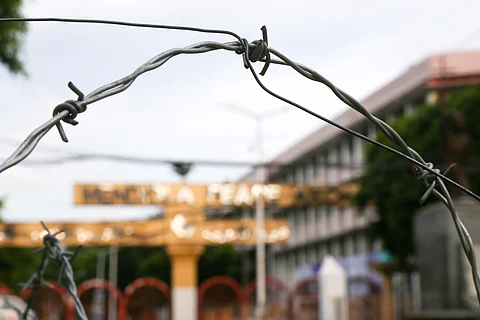
- NEWS
- the EDIT
- COMMENTARY
- BUSINESS
- LIFE
- SHOW
- ACTION
- GLOBAL GOALS
- SNAPS
- DYARYO TIRADA
- MORE

With thousands of police officers now patrolling Metro Manila’s streets and the Philippine National Police (PNP) promising to respond within five minutes to emergency calls, questions are surfacing: Is this renewed visibility a public safety boost — or the makings of a garrison state?
The Marcos administration insists it’s the former.
In a vlog released Sunday by Malacañang, President Ferdinand Marcos Jr. lauded the “Cops on the Beat” initiative of new PNP chief Gen. Nicolas Torre III, saying residents feel safer and that police response times have dramatically improved.
“We have started to deploy more police officers. The feedback from our kababayans is good, and their sense of security has significantly improved,” Marcos said.
But Torre’s aggressive rollout of nearly 70,000 officers nationwide, including 21,000 in Metro Manila alone, has raised eyebrows among civil liberty advocates.Critics say the visibility push — combined with the PNP’s recent announcement that it will now coordinate with the Commission on Human Rights (CHR) in law enforcement operations — could be a calculated move to blunt accusations of an authoritarian drift.
“This level of deployment, while good for deterring crime, could also normalize a military or police presence in civilian life,” a lawyer, who asked not to be named for fear of reprisal, told DAILY TRIBUNE.
“It brings back memories of the Marcos Sr. years during martial law -— flooding public spaces with police and military to assert control and suppress dissent,” he added.
But Torre said the program aims to bring policing closer to communities. He initially promised a three-minute emergency response, later revising it to five minutes.
“Dial 911, and we’ll arrive within five minutes,” Torre said at a Palace briefing last week, assuring the public of faster response times under a revamped emergency system.
According to the National Capital Region Police Office, crime incidents in Metro Manila dropped by 46 percent in the first half of May — from 287 in the same period last year to just 155 this year.
While the administration touts this as proof of success, some observers believe the timing is politically calculated, coming as the government moves to show a more rules-based image amid international scrutiny.
It also comes as the Senate opens on 11 June the impeachment trial of Vice President Sara Duterte, who expressed readiness to face her accusers in a “bloodbath.” (See related story)
Torre jumped over more senior police officials in becoming PNP chief — a reward, some in the opposition say, for the arrest of former President Rodrigo Duterte and swift turnover to the International Criminal Court (ICC) at The Hague.
The PNP chief has expressed readiness to arrest others whom the ICC may implicate in the charges against Duterte — multiple murders in relation to his government’s so-called war on drugs.
He said former PNP chiefs, now Sen. Ronald “Bato” dela Rosa and Oscar Albayalde, may also fall under the ICC’s jurisdiction, if so warranted.
The optics, a former member of the Palace press corps said, suggest a bid to preempt domestic backlash and burnish human rights credentials.
“Suddenly we’re seeing a softer police image — fast, friendly, and now supposedly accountable,” he said. “But without structural reform or clear limitations on police powers, it’s cosmetics.”
Despite these concerns, Marcos doubled down on the initiative, saying that the public overwhelmingly supports it.
Fears of a police state are not unfounded, especially under the shadow of Marcos Jr.’s father. During the martial law years from 1972 to 1981, Ferdinand Marcos Sr. used military and police forces to consolidate power, suppress dissent, and arrest thousands of activists, journalists, and opposition figures.
Civil liberties were curtailed, the press was silenced, and checkpoints, curfews, and surveillance became part of daily life.
The memory of the Marcos Sr. era continues to fuel skepticism over large-scale police deployments, especially under another Marcos presidency promising order and discipline.
Alongside security, the President also highlighted what he called another win in his Sunday vlog: the rollout of P20-per-kilo rice in Kadiwa Centers operated by the Department of Agriculture.
Elderly residents Nacisa Dazon and Sylvia Narcisa praised the program, calling it a lifeline for low-income families facing high prices in traditional markets.
Marcos said there are sufficient stocks at National Food Authority warehouses to sustain the program, provided “everyone works together.”
He also noted that irrigation improvements are underway as part of a “Refleeting Program” to deliver equipment to the National Irrigation Administration.
